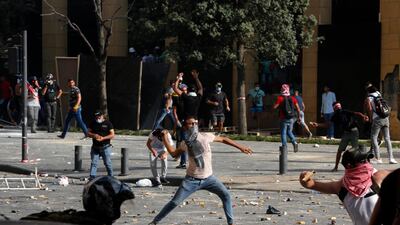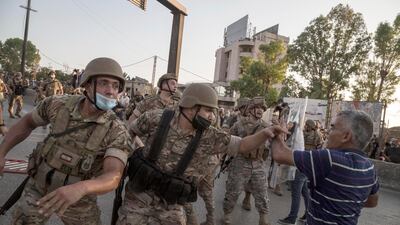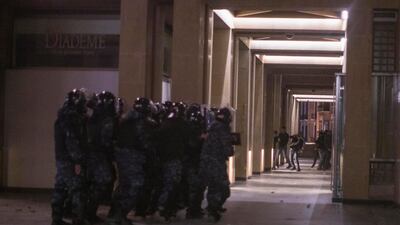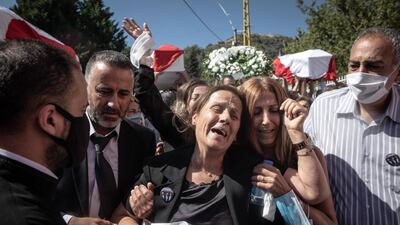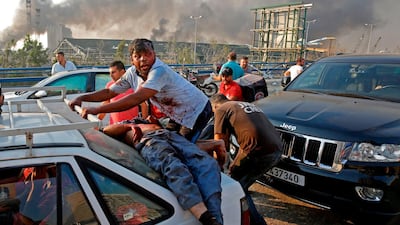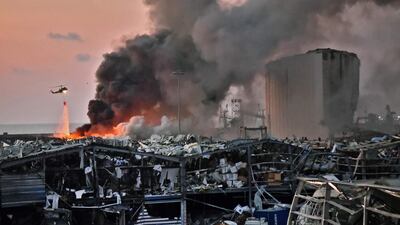Lebanon is facing high security risks as efforts to contain a full-blown economic crisis stall and confidence in the state and its institutions wanes, caretaker Interior Minister Mohammad Fehmi said.
Mr Fehmi, a retired army general and former head of the armed forces' powerful Military Security department, said the risk of security breaches has lately increased.
He was quoting an assessment by the country's various security agencies based on domestic and foreign intelligence.
"Countries around the world are exposed to security breaches but those risks are rising in Lebanon as the system's economic and financial foundations come under increasing pressure," Mr Fehmi told The National.
He said that while security agencies remain on high alert with contingency plans in place, risks will stay high as long as Lebanon’s major parties fail to break the political deadlock and introduce reforms.
Enacting reforms has been a long-time demand of the international community.
It recently became a condition for the release billions of dollars in loans and financial support for Lebanon, which is reeling under the burden of a crisis that will plunge more than half of the population in poverty by 2021, according to the World Bank.
But rival political factions have failed to make headway with reforms laid out by French President Emanuel Macron during a visit to Beirut after its deadly port explosion.
Three months after the blast that destroyed large parts of the capital, killed more than 200 people and forced the resignation of Prime Minister Hassan Diab’s Cabinet, rival factions have failed to agree on forming a new government.
Signs of a breakthrough in talks led by Prime Minister-designate Saad Hariri have yet to emerge amid rising tensions between Iran and US President Donald Trump’s administration, which continues to pile pressure on the Iran-backed group Hezbollah and its allies.
The Trump administration recently sanctioned President Michel Aoun’s son-in-law Gebran Bassil, leader of the largest Christian parliamentary bloc.
Mr Fehmi, who was a senior army officer under Mr Aoun, urged the country’s rival factions to give reforms priority over partisan interests to stabilise the economy and ease security threats.
“We are highlighting the security risks not to sow panic but to urge people to stay vigilant and to report any suspicious activity,” he said.
Mr Fehmi has come under the spotlight on different occasions for his direct and blunt approach.
In recent months, he drew criticism after he recalled in a televised interview the death of two men, when he and other soldiers clashed with members of an armed militia during the civil war.
“Perhaps I came across the wrong way when I spoke of the death of those two men, which I never intended that way," said Mr Fehmi, who was 21 at the time of the clash.
"I and my colleagues had the duty to protect the army as an institution, and ourselves when we were attacked."
Almost 40 years later, he is calling on Lebanon’s politicians to come together and restore trust in the state.
“Put your differences aside for now and focus on implementing reforms to save our country and shield our nation from security threats. That's my message to the political class,” he said several times in the interview.
Lebanon - A year in pictures
Mr Fehmi, who led the Lebanon Mine Action Centre from 2006 to 2011, called on Arab states to continue to support Lebanon.
“Arab states have long supported Lebanon, particularly the UAE, which was a major partner in our efforts to clear mines across Lebanon," he said.
"Today, I call on our Arab friends to stand by Lebanon’s side."
Mr Fehmi said that since his appointment, he has prioritised reforms at the ministry starting with the digitisation of its services to try to reduce red tape and fight cronyism.
“I drew lessons from western developed countries and GCC states whose efforts paid off in this regard, and followed suit,” he said.
His efforts bore fruit with the launch of the Inter-Municipal Platform for Assessment Co-ordination and Tracking platform.
The database, originally launched to track Covid-19 cases in partnership with municipalities and the Health Ministry, has since been expanded to include up-to-date information on more than 560,000 low-income families in need of social assistance, Mr Fehmi said.
“This will help with any future government effort to put in place social assistance programmes,” he said. “Another pillar of my strategy was strengthening law enforcement.
His ministry was largely successful in enforcing measures to contain the Covid-19 virus in the early stages of the pandemic's outbreak before public discontent grew over the economic crisis and compliance with the government measures faded.
The rise in recorded cases prompted another two-week nation-wide lockdown to allow enough time for hospitals to increase their capacity before measures were eased again on November 30.
Mr Fehmi said the current measures would continue to apply, including a curfew from 11pm until 5am, unless the expert ministerial committee on Covid-19 recommended otherwise.








